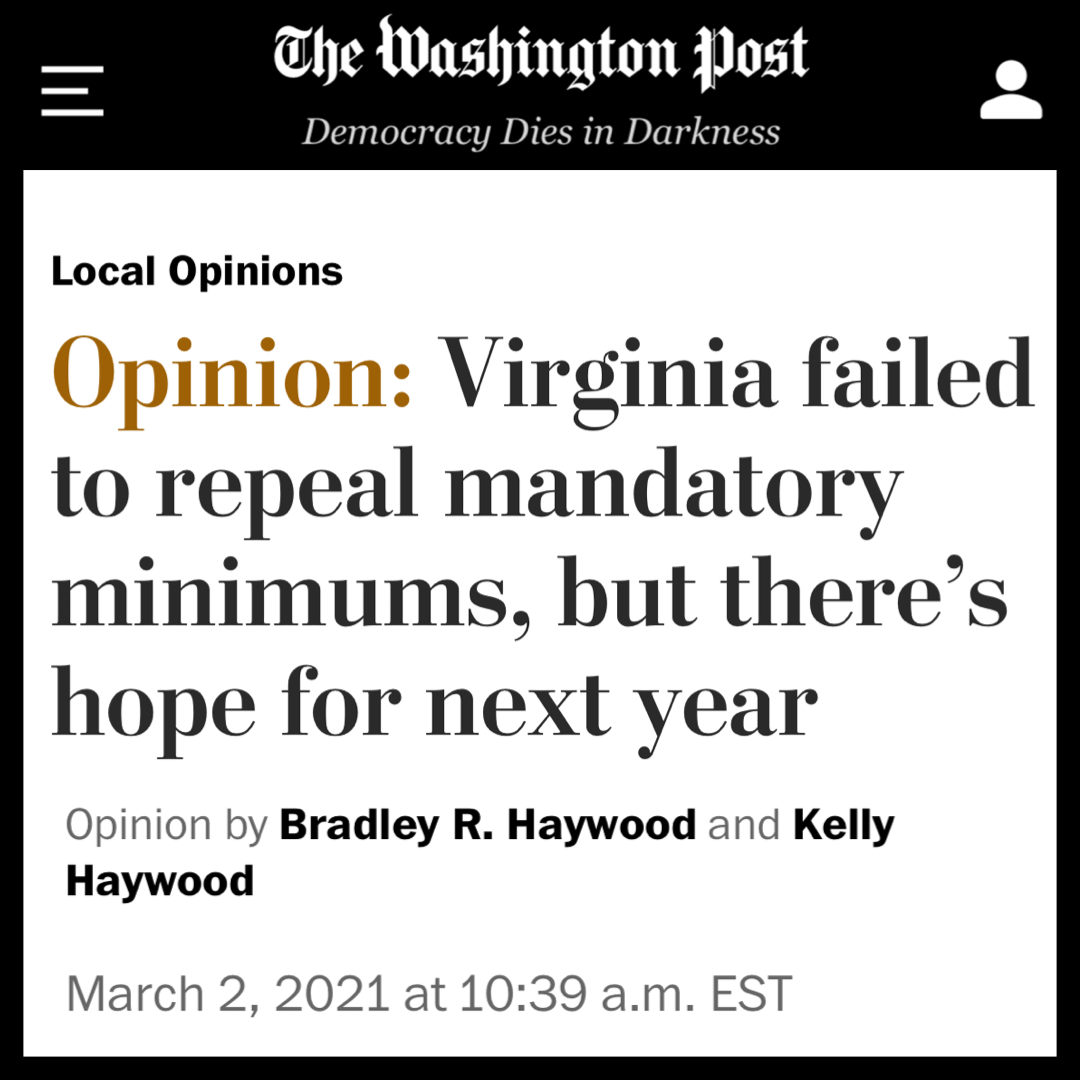Virginia failed to repeal mandatory minimums, but there’s hope for next year
This statement about the failure to pass Mandatory Minimums legislation from Justice Forward Virginia first appeared as an OpEd in the Washington Post on March 2, 2021.
On Saturday, lawmakers assigned to reconcile Senate Bill 1443 and House Bill 2331, repealing mandatory minimum sentencing in Virginia, failed to reach a compromise on bill language, and the proposed legislation died in conference.
From the perspective of criminal justice policy, mandatory minimum sentences are an abject failure. They have been weaponized by prosecutors to threaten defendants out of exercising their fundamental rights to a full and fair trial — rights that are the foundation of our system of constitutional criminal procedure. And, truth be told, that may be their only true purpose: to force plea agreements, thereby depriving defendants of their day in court. The cruelty of mandatory minimum sentences is similarly undeniable. They destroy families, denying judges and juries even the most marginal opportunity to consider mitigating facts or exercise compassion at sentencing. They are applied unequally to defendants of color to a degree that can only be described as overtly racist. Researchers have found that federal prosecutors are 65 percent more likely to charge Black defendants with offenses that carry mandatory minimum time.
Because of this, mandatory minimums are a leading cause of mass incarceration. Thousands of Virginians are serving mandatory minimum sentences. They are disproportionately people of color— 41 percent of Black people in Virginia’s prisons are serving mandatory sentences, while the same is true of less than 26 percent of the state’s White prison population. Mandatory minimums have contributed to a 121 percent increase in the incarceration rate of African Americans in Virginia’s prisons, with Black Virginians now comprising 56 percent of the state’s prison population — nearly three times the population at large. One in 14 minor children has a parent in prison or jail or who has been, and 1 in 9 Black children has a parent in prison or jail or who has been. Mandatory minimums promote the eradication of the Black family unit, contributing to the destruction of the vitality, health, emotional and financial well-being of those communities.
As it stands, more than 95 percent of criminal cases are resolved through plea agreements. This is because of a phenomenon known as “The Trial Penalty,” which is driven in large degree, if not primarily, by mandatory minimums. The majority of those charged with a crime that requires a mandatory minimum sentence opt out of trial, understanding the risk to be simply too great: The judge or jury’s hands are tied to extreme mandatory time if a guilty verdict is imposed. This is true even of defendants who are innocent. Mandatory sentencing requirements create a broken process that often requires trading one’s innocence for guilt in a bargain for a lesser sentence, and they always exert undue influence on outcomes. Even where guilt is clear-cut, it is hard to say that the result of any process influenced by mandatory minimums is truly just.
We could not be more disappointed that the legislature failed to repeal mandatory minimums this session, particularly when the proposed legislation had no real policy opposition. The Virginia State Crime Commission issued findings months ago recommending the repeal of all mandatory minimums. The lead conferee for the House of Delegates was Del. Michael P. Mullin (D-Newport News), a deputy commonwealth’s attorney and member of the Crime Commission. He voted for full abolition in the Crime Commission, but apparently held the line for partial repeal when Senate conferees demanded full repeal in conference. Many lawmakers, including leadership in both chambers, have campaigned and continue to campaign on a promise to repeal mandatory minimum sentencing for all. Organizations spanning the political spectrum have formally supported full repeal: conservatives, liberals, progressives, libertarians, law enforcement, faith-based organizations, victim-rights groups, civil rights leaders, sexual and domestic violence survivors, racial justice advocates, prosecutors, public defenders and the majority of the state’s eligible voters. Mandatory minimums are a racial justice issue and a human rights issue, and they are an insult to civil liberties, and we will not stop fighting until the General Assembly ceases allowing this injustice to exist.
We thank Sen. John S. Edwards (D-Roanoke) for carrying the legislation we supported, and state Sens. Scott A. Surovell (D-Fairfax) and Joseph D. Morrissey (D-Richmond) for their unwavering commitment to abolishing mandatory minimums in Virginia. We are inspired by the tireless advocacy of activists, organizations and families who fought for repeal this session, and trust we have gained allies in the broader movement for criminal justice reform. An incredible debt of gratitude is owed to FAMM Foundation, which brought institutional strength and expertise to our campaign, working with lawmakers and advocacy organizations such as ours before and during session. To echo their sentiments, “this fight is far from over, we will come back next year to fight for a legal system that prioritizes individualized sentences and second chances.”
We leave you with this word: In 2022, let us put principle before politics. If you believe mandatory minimums are unjust, then commit to ending injustice. Repeal mandatory minimums — all of them. Lives, liberty and the moral authority of our criminal legal system hangs in the balance.
Bradley R. Haywood is executive director of Justice Forward Virginia. Kelly Haywood is director of communications for Justice Forward Virginia.

